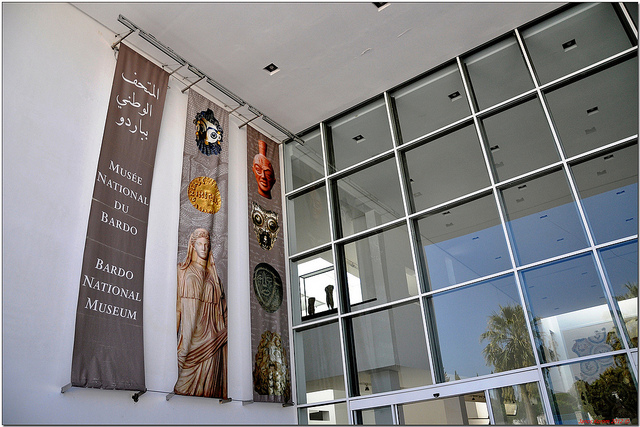CT Scan
Posted By Stephanie Huang on March 19, 2015 @ 14:30
This week’s CT Scan features the Tunis attack, Australian CT laws, passport cancellations, radicalised teens, the Islamic State hostage experience, families, prison and how to study CT.
On Wednesday, at least 20 people were killed when two gunmen stormed [2] into the Bardo National Museum in Tunisia’s capital, Tunis. The incident spiked Tunisia’s swelling fears that Islamic State violence is spreading from neighbouring Libya, particularly with over 7,000 Tunisians [3] having joined the organisation’s ranks.
The controversial metadata bill continues its rocky ride, despite the Australian government’s concession on increased protection of journalists’ sources. See here [4] for why the Sydney Morning Herald thinks that those changes are still not enough. However, reforms should be carefully considered; a survey [5] found that three-quarters of Islamic Australians thought that laws passed since 9/11 unfairly targeted Muslims. The authors caution that these experiences could add fuel to the extremist narrative that ‘Muslims are a suppressed and victimised minority’.
Revelations [6] that over 400 people are stopped every day by CT officials at Australian airports has bolstered anxieties that cancelling passports creates ‘ticking time-bombs’ at home (see here [7] and here [8]). Melbourne teenager Jake Bilardi’s a case in point, [9] having planned to set off bombs in Melbourne as his Plan B if his travel plans were thwarted. ASPI’s John Coyne considers [10] what can be done about this potentially risky group; he argues the problem can’t be solved with a Western approach (currently consisting of jail, control orders, surveillance and ‘soft kumbaya strategies’). He favours government-supported deradicalisation efforts delivered by ‘moderate’ Muslims.
And what should we do about returning foreign fighters? Director of the German Institute of Radicalization and De-Radicalization Studies, Daniel Koehler, says [11] they should be allowed to come home, because locking them out is more risky than letting them back in. Koehler points out that people who want to leave Islamic State could be some of the most ‘valuable voices’ against it; that Islamic State can provide fake passports allowing foreign fighters to return anyway; and that it’s better for those people to come back to deradicalisation programs. Australian terrorism expert Nick O’Brien agrees [12]. Regarding potential policy initiatives, Brookings recently released a paper [13] that sets out five points at which foreign fighter terrorist activity in the West can be disrupted.
To shed light on radicalised youth, national broadcaster ABC released [14] a piece on why young Australians are being drawn to Islamic State and what to do about it, from the perspectives of key stakeholders. Experts also observed [15] that Islamic State recruiters work in the same way that paedophiles do; they build a friendship online with vulnerable teens, and by the time they meet in person, the victim is ‘in too deep to know better’.
Meanwhile, two Spanish journalists have offered a chilling insight into the hostage experience. Formerly captured by Islamic State, they shared their experiences including details of torture and mock executions. Repeated mock executions could explain why the victims in Islamic State beheading videos look so calm [16].
What is the role of families in CT? On Monday, the UK rolled out a campaign [17] targeted at mothers that runs ads on ethnic minority media channels, highlighting the significance of the mother-daughter relationship and encouraging open dialogue between them. This campaign runs on the premise that mothers are often the first to notice behavioural changes. Similarly, in Germany the Hayat program [18] works with families to de-radicalise Islamic extremists. Listen to an interview with co-founder Daniel Koelher and hear about how he teaches families to ‘add colour’ to the ‘black-and-white’ narrative that radicals construct here [18] (8 mins). Islamic State seems to think that families are important too, having just revamped its strategy [19] by telling potential recruits not to speak to their families or give away signs of radicalisation.
‘Prisons are a massive incubator for (Islamist) radicalization’. EU anti-terror chief Gilles de Kerchove’s warning [20] last year (see similar sentiments here [21] and here [22]) has spurred concrete action. On Saturday, Belgium announced [23] that prisoners at risk of radicalising others will be isolated. France—a nation with a 50% Muslim inmate population—is doing the same thing [24].
Finally, in response to last week’s mention [25] of the need to study CT using empirical science, four US academics in the Washington Post have provided a thoughtful counter-argument [26]:
‘…breaking off “terrorism research” as a field distinct from broader research into political violence is like studying diabetes without thinking about peoples’ eating habits. Most terrorism happens within the context of broader conflicts and is often fed by them.’
Because properly randomised controlled trials are often not readily available in relation to terrorism research, the academics advocate a diverse mixture of methodological approaches: ‘If we want to know “what works” in terms of violence reduction in fragile and conflict affected states we need to thoughtfully triage between experimental and observational work.’
Stephanie Huang is an intern at ASPI. Image courtesy of Janos Korom Dr [27].
Article printed from The Strategist: https://www.aspistrategist.org.au
URL to article: https://www.aspistrategist.org.au/ct-scan-5/
URLs in this post:
[1] Image: http://www.aspistrategist.org.au/wp-content/uploads/2015/03/8020558796_0c8f22e23f_z.jpg
[2] two gunmen stormed: http://www.theguardian.com/world/2015/mar/18/eight-people-killed-in-attack-on-tunisia-bardo-museum
[3] over 7,000 Tunisians: http://www.mcclatchydc.com/2015/03/17/260058/more-than-7000-tunisians-said.html
[4] here: http://www.smh.com.au/comment/smh-editorial/the-metadata-law-should-not-degrade-the-freedoms-it-seeks-to-defend-20150317-1m15h0.html
[5] survey: http://www.theguardian.com/world/2015/mar/16/three-quarters-of-muslim-australians-feel-they-are-unfairly-targeted-by-terror-laws-study-reveals
[6] Revelations: http://www.abc.net.au/pm/content/2015/s4196529.htm
[7] here: https://www.google.com.au/webhp?sourceid=chrome-instant&ion=1&espv=2&ie=UTF-8#safe=active&tbm=nws&q=passport+cancellation+australia
[8] here: http://www.watoday.com.au/wa-news/passport-cancellations-may-shift-extremist-focus-on-to-australia-20150113-12nehs.html
[9] case in point,: http://www.smh.com.au/world/jake-bilardi-reportedly-killed-in-islamic-state-suicide-bombing-planned-to-attack-melbourne-blog-says-20150312-141u9d.html
[10] considers: http://www.afr.com/opinion/muslims-must-be-part-of-program-to-train-radicalised-teenagers-not-to-kill-20150315-144f4w
[11] says: http://www.abc.net.au/lateline/content/2015/s4198926.htm
[12] agrees: http://www.smh.com.au/national/border-force-counterterrorism-unit-ramps-up-efforts-to-detect-potential-jihadists-trying-to-leave-australia-20150315-144eav.html
[13] paper: http://www.brookings.edu/~/media/research/files/papers/2014/11/western-foreign-fighters-in-syria-and-iraq-byman-shapiro/be-afraid--web.pdf
[14] released: http://www.abc.net.au/news/2015-03-13/islamic-state-radicalisation-extremism-young-australian-muslims/6307880
[15] observed: http://www.smh.com.au/national/luring-children-to-fight-in-syria-is-like-paedophiles-grooming-victims-say-experts-20150314-143qfr.html
[16] look so calm: http://www.washingtonpost.com/blogs/worldviews/wp/2015/03/11/why-did-victims-in-islamic-state-beheading-videos-look-so-calm-they-didnt-know-it-was-real/?tid=sm_fb
[17] rolled out a campaign: http://www.ilkestonadvertiser.co.uk/news/local/derbyshire-police-launch-counter-terrorism-campaign-1-7157265
[18] Hayat program: http://kwit.org/post/german-program-helps-families-de-radicalize-members-prone-extremism
[19] revamped its strategy: http://www.theaustralian.com.au/in-depth/terror/isis-warns-targets-not-to-tell-families-of-radicalisation/story-fnpdbcmu-1227267044126
[20] warning: http://www.israelnationalnews.com/News/News.aspx/192612#.VQoRP46UfC8
[21] here: http://www.cbc.ca/news/politics/radicalization-a-growing-risk-in-canadian-prisons-experts-warn-1.2928373
[22] here: http://icsr.info/wp-content/uploads/2012/10/1277699166PrisonsandTerrorismRadicalisationandDeradicalisationin15Countries.pdf
[23] announced: http://www.i24news.tv/en/news/international/europe/64393-150315-belgium-to-separate-prisoners-who-may-radicalize-others
[24] doing the same thing: http://www.bbc.com/news/world-europe-31918202
[25] mention: http://www.nytimes.com/2015/03/08/opinion/sunday/where-terrorism-research-went-wrong.html?_r=2
[26] counter-argument: http://www.washingtonpost.com/blogs/monkey-cage/wp/2015/03/16/how-empirical-studies-of-political-violence-can-help-policymakers/
[27] Janos Korom Dr: https://www.flickr.com/photos/korom/8020558796/in/photolist-de1BnA-de1NiD-de1A5K-de1MLD-de1rRT-ddKsGu-de1Eyv-de1pC2-de1JwP-de1EN2-de1NQ5-de1Lt6-de1oET-de1N9v-de1wid-de1K4u-de1Dng-de1BTC-de1N5f-de1Jxu-de1w2D-de1LHW-de1BPB-de1GA4-de1FBe-de1Cvv-de1t5r-de1oh2-de1vKY-de1HRk-de1LRP-de1JL4-de1Duo-de1LC6-de1w3W-de1y3A-de1AkN-de1tWX-de1vcd-de1sXp-de1PRu-de1F15-de1MzB-de1r39-de1BwV-de1Mg8-de1HUJ-de1zsY-de1Ktu-de1PPP
Click here to print.
